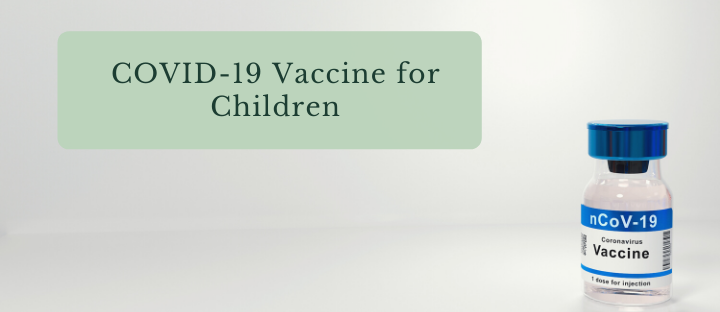At the end of October, the FDA authorized the emergency use of the Pfizer-BioNTech COVID-19 vaccine for children ages 5-11. Similar to the response in older children and adults, the Pfizer vaccine was found to be about 91% effective at preventing COVID-19 in children 5 through 11. Additionally, prior to authorization, the vaccine’s safety was studied in over 3,000 children and no serious side effects have been detected.
Although children are at lower risk of becoming severely ill from COVID-19 infection compared with adults, children ages 5-11 can still become infected with the virus, spread it to others, and in some cases become very sick. The spread of the Delta variant has particularly influenced children and adolescents, whose hospitalizations due to COVID-19 increased fivefold during a six-week period this summer. Along with other preventative measures, the vaccine is one method that can help to protect children from COVID-19. Vaccinating children can also help protect other family members, including those who are not yet eligible and those who are at increased risk of getting very sick if they are infected.
Safety
Concerns about the safety of the vaccine are completely valid, especially when it comes to decisions about your children’s wellbeing. Keep reading below for some quick facts about vaccine safety.
- COVID-19 vaccines are being closely and continuously monitored for safety.
- Serious health events after COVID-19 vaccination are rare.
- There have been cases of myocarditis (inflammation of the heart muscle) and pericarditis (inflammation of the outer lining of the heart) reported after Pfizer-BioNTech COVID-19 vaccination of children ages 12–17 years. However, these cases are very rare. Read more about myocarditis and pericarditis after vaccination here.
- A severe allergic reaction, like anaphylaxis, may happen after any vaccine, including COVID-19 vaccines, but this is rare.
- Children cannot get COVID-19 from receiveing any COVID-19 vaccine.
- There is no evidence that COVID-19 vaccines cause infertility.
Side Effects
Possible side effects at the site of vaccine injection include pain, redness, and swelling. Throughout the rest of your child’s body, they might experience tiredness, headache, muscle pain, chills, fever, or nausea. Side effects from the vaccine should go away within a few days, and some people have no side effects.
Dosing and Administration
Children ages 5 through 11 receive a dose of the Pfizer-BioNTech COVID-19 vaccine that is appropriately dosed for their age, therefore it is smaller than the adult vaccine. However, children and teens ages 12 and up receive the same dose of the Pfizer vaccine as adults. Like for adults and adolescents, children ages 5-11 will need a second dose of the vaccine three weeks after their first shot.
More Information
Decisions about your child’s health are important. Being as informed as possible can help make these decisions easier. For more information about COVID-19 vaccines for children, visit the links below.
CDC COVID-19 Vaccines for Children and Teens
CDC Safety of COVID-19 Vaccines
FDA Child Vaccine News Release

